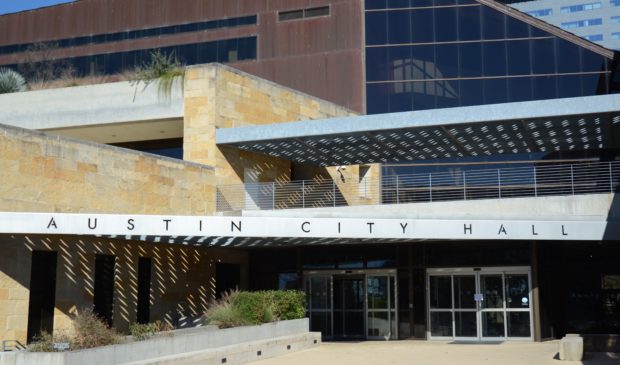Pushing land use equity, new coalition looks to build new activists around city policies
Wednesday, September 25, 2019 by
Chad Swiatecki A cross section of local social justice and housing activists have joined the four Council members representing the city’s Eastern Crescent communities to advocate for more equity and inclusion of people of color in the city’s housing plans.
The group, known as Planning Our Communities, held a press conference at City Hall Tuesday to announce its formation and its aim to increase public engagement in the city’s ethnic and other marginalized communities. Because the group has no plans to register as a nonprofit, it has no formal funding at this point.
Council members Natasha Harper-Madison, Pio Renteria and Greg Casar and Mayor Pro Tem Delia Garza spoke about the city’s recent progress in adding diversity to City Council, and increasing the numbers of people of color participating in forums and other activities that can broaden the scope of city policy.
The group’s first major activity will be associated with the coming delivery of the city’s new land use code, which is expected to be revised based on public comment and adopted by the end of the year.
“The first thing we’ll be doing is what everyone will be doing – going over the text and the map and working with our community on the things we want to highlight in our Land Development Code,” POC spokesperson Awais Azhar said. “One of the first things we want to work on as a group is our Land Development Code and ensure that it is equitable in the way that it works for communities, including communities of color and working-class communities.”
Azhar said some of POC’s biggest priorities include advocating for the creation of additional housing planned with equity in mind, fighting gentrification in East Austin and pushing for improved transportation policy.
Casar said the group is looking to cultivate the next generation of civic leaders and potential Council members and to amplify work being done largely behind the scenes to create more affordable housing. He said those new voices can help Austin break out of a political mindset that’s “trapped in the 1990s” and based around a binary framework of residents being archly pro- or anti-development.
“This group is a home for younger activists and younger people of color and people that care about equitable development,” Casar said. “So many of the folks standing behind me have been doing this work for a really long time, but so often get ignored or left out of the traditional narrative about housing policy and transit policy in our city.”
POC has some similarities to For All Austinites, a group Casar, Garza, Renteria and Council Member Jimmy Flannigan formed in 2017 that pushed against many facets of the initial draft of the land use code – then known as CodeNEXT – targeting the potential for gentrification and sprawl. The CodeNEXT process was canceled last summer and restarted earlier this year, with City Manager Spencer Cronk and other city staff building off much of the work done for CodeNEXT.
Garza said the change of Council’s makeup after the change to geographic districts, known as the 10-1 system, has helped bring more diversity to city policy, with groups like POC helping to build on that momentum in the name of more equitable housing across the city.
“I have seen so many things since the implementation of 10-1. We have one of our youngest Councils, our most diverse Council and a female majority Council that we’ve been able to hold on to. I’m excited to be here with Planning Our Communities to see new faces … not new to policy but new to getting engaged in the conversations that are so important as we discuss equity in our land use.”
Building on Renteria’s comment that high-wealth areas in West Austin would have to feel some of the effects of the need for more housing throughout the city, Azhar said improving opportunities for people of color will be one of the group’s other objectives.
“We do know there are disparities that exist within our city. We do want to conquer that. We do want to see more affordable housing in general in high-opportunity areas,” he said. “At the same time, we don’t want to encourage displacement in East Austin or other historical communities of color either.”
Photo by John Flynn.
The Austin Monitor’s work is made possible by donations from the community. Though our reporting covers donors from time to time, we are careful to keep business and editorial efforts separate while maintaining transparency. A complete list of donors is available here, and our code of ethics is explained here.
You're a community leader
And we’re honored you look to us for serious, in-depth news. You know a strong community needs local and dedicated watchdog reporting. We’re here for you and that won’t change. Now will you take the powerful next step and support our nonprofit news organization?




